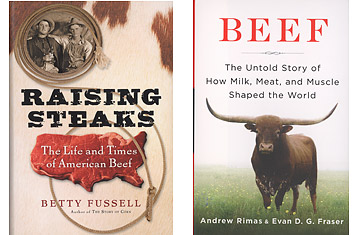
Raising Steaks: The Life and Times of American Beef
Betty Fussell
Harcourt; 402 pages
Beef: The Untold Story of How Milk, Meat, and Muscle Shaped the World
Andrew Rimas & Evan D.G. Fraser
William Morrow; 238
The Gist:
Who knew beef was so powerful? According to this new pair of bovine books, the cow has greatly influenced the history of America (says Fussell) and the history of, oh, all of human history (claim Rimas and Fraser). Fussell, a vigorous and delightful writer, focuses her laser-sharp observations on the American West, while Rimas and Fraser are a little rangier, spanning from prehistory to the present and from Argentina to Africa.
Highlight Reel:
1. From Beef, on the industrialization of cattle: "Cows are animals, and we used to treat them as such. We exploited them alive and dead, but we left them in enough peace so that they could fulfill their life's purpose, which was to stand in a pasture and chew. By yanking them from their habitat, breeding them to physiological extremes, and pushing them through an industrial process as if they were identical to Model Ts...we came to think of them merely as milk wells to be tapped and burgers to be neatly wrapped in polyurethane.
2. From Raising Steaks, on rodeos: "With indoor rodeos, what you first notice is the smell, a combination of dirt, dung, hay, sweat, boredom, excitement, and fear. What you notice second are red, white, and blue flags in every shape and size hung like laundry...At the Pike's Peak Rodeo in Colorado Springs in August 2004, an Air Force general opens the show with 'Our boys over there are lassoing terrorists, they're riding herd, so let's RODEO!' The audience cheers. The emcee announces that Julia Child died today and that her favorite meal was 'Read meat and a bottle of gin.' The audience cheers again."
3. From Beef, on the dangers facing the cattle industry: "Here's a brief list of potential calamities: a disease in the production chain, a drought that cuts grain supply, rising fuel costs, pathogens, antipollution taxes, foreign competition, unexpected hazards from cloning, and even the possibility that consumers suddenly take fright, perhaps accepting the antimeat rhetoric that their favorite food may be steeped in hormones and antibiotics."
4. From Raising Steaks, on the Beacon Beefsteak, a night of beef eating and male bonding: "It's every caveman for himself, clasping his meat like a hunk of mastodon, gnawing flesh that resists seductively before it yields, squirting fluids red with blood and fat over my hands and down my chin...Elbows out, the men sitting either side of me lunge for the platter to see who can sop up the most sauce with their bread and fill their triple-sized shot glasses from the bottles of Maker's Mark that line the tables, to see who can toss down the most boilermakers. This meal is not for wimps. As we tear and chew and slurp, the band segues to jazz and then to old pop favorites like 'A Bicycle Built for Two.' In a moment we are all on our feet together, singing 'God Bless America.'"
The Lowdown:
It's a hefty task, trying to tell the history of man through a single animal. Beef attempts this, much in the vein of the many "(Name of Product): How (synonym for name of product) Changed the World"-type books that have flooded the market in the past decade. And it does a lot of admirably hefty lifting, offering fascinating interludes about Spanish bullfighting and Masai tribesmen in some places and a really delicious rib recipe or a listing of different cheeses in others. But the authors' florid writing—"Herders constitute neither the world's oldest profession, nor indeed the second oldest. But they are the most historically divisive."—turns the prose into a plodding beast clearly in search of lightness.
Fussell's more focused book limits itself to American beef, but somehow feels more expansive and ambitious. In puncturing mythology of the West, she pits The Cowboy against The Machine: On one side are the old-timers, so in love with nostalgic ideals of land and horizon and freedom that they fail to realize that the cattle industry is a rich man's game, made for those on the other side with the money, fuel and machinery that go into making cattle so profitable. Like Beef, and many books before it, Raising Steaks reminds us that as tasty as burgers and steak may be, there's a price to be paid — in oil, land and treasure.
The Verdict:
Raising Steaks: Read
Beef: Skim
